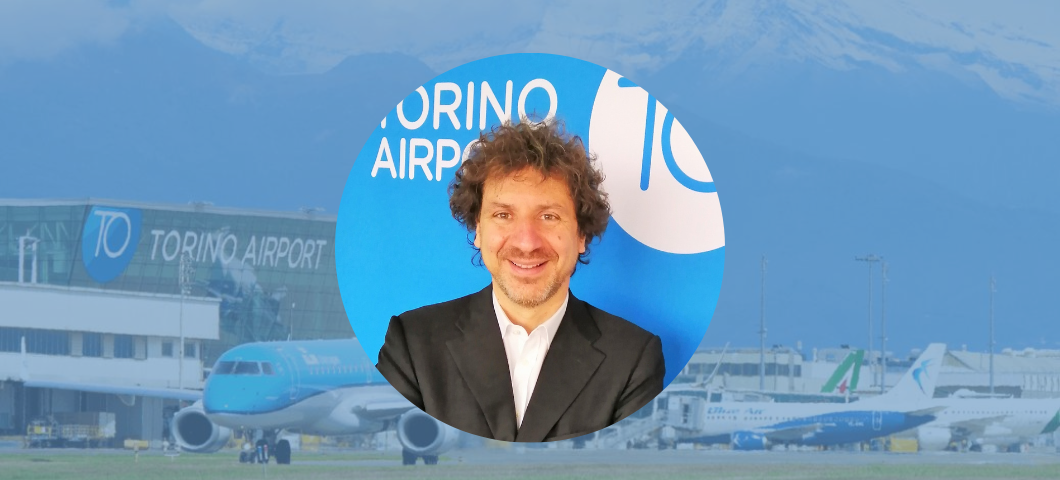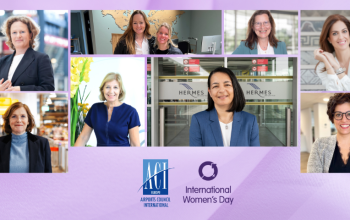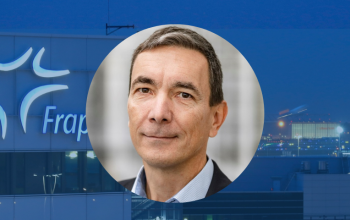
Five Minute Feature #RACEChania special edition: Andrea Andorno
On the side of #RACEChania, we caught up with the Vice-Chair of the Regional Airports’ Forum, Andrea Andorno, Chief Executive Officer of Torino Airport, to discuss the recent publication of “European Regional Airports – Sustainably connecting people, places and products“.
What was the inspiration/motivation behind the Forum’s new report “European Regional Airports: Sustainably Connecting People, Places and Products”?
Regional airports have been an active part of the recovery and they represent a pillar of European air connectivity. But while keeping their focus on the post-Covid restart strategy, sustainability will be more and more a priority factor going forward.
We are fully aware that after a pandemic that has bent the entire world, and in particular our industry, a moment of reflection on the state of the art was necessary. It was needed because of the new requirements brought to light by the pandemic itself and because of the challenges posed by the climate crisis that started well before the outbreak of the pandemic.
Taking also into account the Russian-Ukrainian conflict in the heart of Europe and the energy crisis that came with it, it was unthinkable to believe that our industry could go on in the same way as before.
While growing our business we must be able to make it sustainable not only for the environment in which we operate but also for people, communities and not least for the governance of the business itself.
It’s a big topic you’ve set out to cover… what are the main headlines emerging from it? What are some of the biggest struggles facing regional aviation currently – is it all around the COVID-19 recovery and current inflationary pressures?
First of all, I would like to emphasise again the importance of being aware of the strategic role that regional airports play in connecting territories, businesses and people. We should never forget it, because through our activity we are a vehicle for prosperity.
There are challenges that regional airports have to face on a daily basis: from the high level of competition to attract airlines to the difficulty of achieving a sound financial performance, particularly in such a changing context as the current one, with inflation really impacting all of us. In addition, the attention to putting in place initiatives to tackle the climate crisis emerges strongly.
How has the landscape of regional aviation in Europe changed since the onset of the pandemic, and what steps are airports taking to adapt to these changes?
The regional airport sector has changed drastically compared to the pre-pandemic period. In recent years, the role of airlines has also changed, with the strengthening of the large low-cost players and the ongoing consolidation into a few large groups among the full-service airlines: carriers have also felt the impact of the pandemic and their recovery seems more based on yield increases instead of additional capacity. Nowadays, it has become even more difficult to keep airports financially viable, since charges do not follow instantly inflation trends.
Airports must also keep paying the utmost attention to investments improving the passenger experience and enhancing intermodal accessibility of the territory.
For example, in terms of improving passenger experience, Torino Airport is one of the few European airports of its size that has installed the 3D security check, which allows the scanning of liquids and electronic devices inside hand luggage. On the intermodality front, our infrastructure has an integrated railway station, which until now was connected to the local railway network: from the end of 2023, the same railway network will connect our airport to the national network and the high-speed network, thus contributing to increasing the connectivity of the territory.
Decarbonisation is an important issue for the aviation industry as a whole. What role do you see regional aviation playing in the decarbonisation efforts of the sector?
Decarbonisation it’s a must but, taking into account the higher costs of the environmental transition, timing will be a great challenge to face as well.
Torino Airport has been working for years to be more efficient and sustainable: in July 2021 we launched the ‘Torino Green Airport’ project, which brings together all the initiatives put in place in the past, those underway and those to come to make the airport even more sustainable.
We have just completed the roof covering of the Passenger Terminal with photovoltaic panels which, when fully operational in Q3 2023, will be able to generate up to 12% of the airport’s energy needs. We are also renewing the airport fleet and non-airport vehicles, with the aim of having hybrid or fully electric vehicles, a process already allowing us to carry out some of the airport turnaround activities 100% green, zeroing the emission of CO2 into the environment. We have also obtained ACA -Level 3 Optimisation certification at the end of 2022 and we are partners in European research projects such as TULIPS and AZEA aimed at studying solutions to make the entire industry even more sustainable.
Could we have done more or acted earlier? Yes, but Covid did not help us for sure taking a strong financial toll on airports (higher debt burden).
Staffing challenges are a common issue for many industries in the current saturated job market, including aviation. What steps are regional airports taking to attract and retain top talent?
The most important aspect of attracting and retaining talent is being able to offer a stimulating environment that can support in maintaining the delicate work-life balance, an aspect that in this post-Covid has become an increasingly decisive issue in career choices.
Our sector needs professionals spanning an enormous range of skills, from the more technical to soft skills such as empathy and problem-solving abilities in dealing with an emergency. It is strategic to ensure that talent stays with the company, Torino Airport has always paid great attention to its human resources, with the institution of an extensive work-from-home policy, as well as articulated welfare plans, ranging from health care to summer camps for employees’ children. We all know a high employee turnover rate is potentially critical to operations too.
Looking to the future, what is your outlook for the regional aviation industry in Europe, and what steps are you taking to ensure that your airport is well-positioned for success in the years to come?
In the near future, it will be crucial for regional airports to be able to get involved and adapt to change: it is necessary to be flexible and know how to seize the opportunities for innovation that the changing scenario offers. Our airport from November 2021, thus in the midst of the pandemic, became a base for Ryanair, which opened many new point-to-point routes, most of them international. This has brought about an enormous change, with large volumes of passengers and tourists arriving at the airport and in the territory: thanks also to the territory’s ability to seize this opportunity, the entire region is benefiting from this development.
If you had one wish, what would you change about the current regional aviation landscape and why?
National or European regulators’ approach sometimes appears to be too simplistic. Europe is a huge continent that must rely on its citizens to be able to travel easily from one country to another. Targeting regional airports with regulations limiting traffic for environmental reasons without taking into account the above seems to be neither fair nor in the interest of Europe and its citizens.
I wish the approach from regulators could always be aimed at accelerating the change in a more proactive way, by providing support to sustain the changes needed to reach as soon as possible greener aviation, also for smaller airports. And from what was discussed at the conference, something is definitely moving at the European level.
Andrea Andorno has been the Chief Executive Officer of Torino Airport since January 2019. He is an aviation expert with over 20 years of experience in the industry holding executive roles first within airlines, then within airports. Andrea has also been the Vice-Chair of the ACI EUROPE Regional Airports Forum since March 2022.



